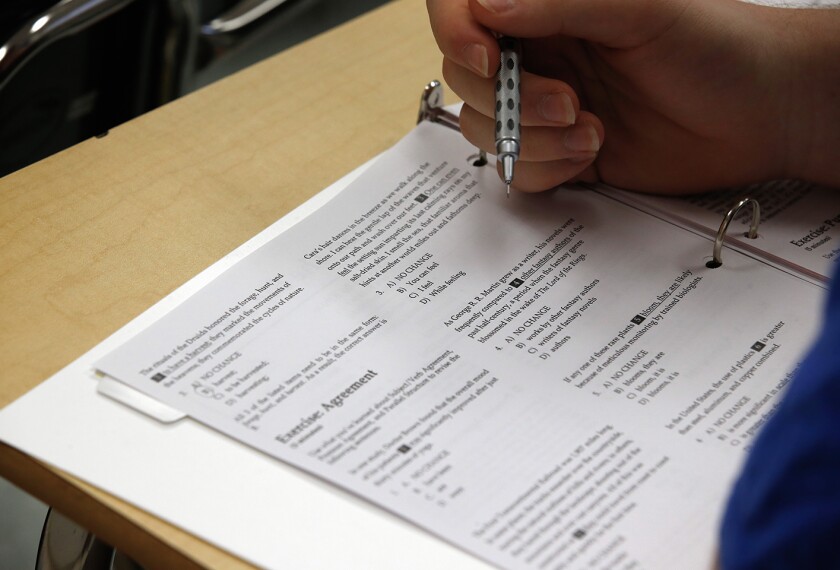The end is in sight for the trend line that has served as a gauge of student achievement in reading nationwide for more than a decade.
Late last week, the board that sets policy for the National Assessment of Educational Progress was poised to adopt a new framework for the NAEP reading test that would change the content significantly enough to prevent the continuation of comparisons among tests. A new trend line would begin.
The framework would guide development of reading-test questions beginning with the 2009 administration for 4th, 8th, and 12th grades. The current framework, which has been used since 1992, will be retained through 2007, during which time the reading test will be given three more times. With those results, there will be 15 years of trend data on that test in total.
If the new framework is adopted, as expected, NAEP would test students’ reading comprehension on two types of texts: literary, which could include fiction and literary nonfiction, such as narrative essays, speeches, and biographies, as well as poetry; and informational, such as explanatory texts, persuasive writing, documents, and graphic presentations. For the first time, the test would also include items that explicitly measure students’ vocabulary knowledge. Students would be asked to answer questions about the meanings of words in the context of selected passages.
“We believe the framework will provide a rich and accurate measure of the reading comprehension and analytical skills that students need both for their schooling and for their lives,” the National Assessment Governing Board, the policy-setting body, says in the framework. “The governing board hopes that this reading framework will serve not only as the means to report on reading achievement but also as a catalyst to improve it for the benefit of students themselves and for the nation.”
Vocabulary Questions
In line with NAEP policy, says the proposed framework, the new test would not endorse particular instructional methods. The framework, however, reflects “research based” practice as required by the No Child Left Behind Act. The addition of the vocabulary component—one of the key elements of effective instruction identified by research—signals a movement in the field toward explicit teaching of basic reading skills.
Still, some officials said the development of the framework transcended the field’s historical debates over teaching methods and found a compromise among experts who subscribe to literature- and skills-based instructional approaches alike.
“Both constructivists and traditionalists came together in this framework,” said Denny Palmer Wolf, a board member and a researcher for the Annenberg Institute for School Reform, located in Providence, R.I. “This framework provides a much more precise instrument … for measuring students’ abilities to comprehend what they read in English.”
The 19-member steering committee included educators, researchers, and representatives from education organizations and publishers. The group worked well together to build consensus on the framework, despite a range of views on the best approaches to teaching reading, said Alan E. Farstrup, a committee member.
“It’s a very well-thought-out framework that builds on previous ones,” said Mr. Farstrup, the executive director of the International Reading Association in Newark, Del. “It does more with [skills-related] questions of vocabulary, for example, but still builds in a lot of very powerful open-ended response items.”
The new test would provide additional indicators of student performance. Separate results for the literary and informational questions, as well as for the vocabulary items, would provide more specific information on how students perform on different reading tasks.
Lost in the new test, however, would be the ability to compare student achievement from previous years. Since the board announced the plans for a new framework, which was drafted by the Washington-based American Institutes for Research, members have struggled to balance the need for change with the importance of maintaining trend data.
Some experts lament the loss of the trend information, but acknowledge the practical need for doing so. A different test, the so-called long-term trend NAEP in the subject, will still be given annually, as it has been over the past 30 years.
“It would be silly to restrict the test in order to continue the trend line,” said the IRA’s research director, Cathy Roller. “We need an assessment of what’s important today.”




